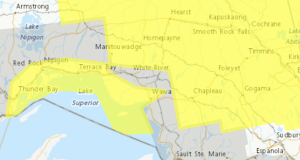Last year, some may remember some major breaking stories in The Globe and Mail and the Manitoulin Expositor about contract negotiation and other serious issues surrounding the First Nations and Inuit Policing Program (FNIPP). Essentially, three First Nations police services, the UCCM Anishnaabe Police Service, Treaty Three Police Service and the Anishinabek Police Service, had stopped receiving funding because of their refusal to accept an imposed “take-it-or-leave-it” contract that didn’t meet the needs or concerns addressed by the communities they served. Eventually, the Federal Court ordered Public Safety Canada to reinstate funding to those Indigenous police services for 12 months. It was certainly not a perfect outcome, but the court made it clear that the federal government had an obligation to allow those police services to negotiate in good faith for funding, and that the communities served by those police services would suffer “irreparable harm if mandatory injunctive relief” was “not granted.”
While it was always clear that this was not an issue merely for those three police services, last week’s Auditor General’s report paints a frustrating picture of the Federal government refusing to meet its commitments to Indigenous policing across Canada. The FNIPP is a cost-sharing initiative between the federal and provincial and territorial governments. It is designed to improve the safety of Indigenous communities and should be treated similarly to other police services. Public Safety Canada is the federal department overseeing the program. Auditor General Karen Hogan’s report states Public Safety Canada “as the lead in managing and overseeing the program, did not work in partnership with Indigenous communities to provide equitable access to policing services that were tailored to their needs.” This is an essential part of the program, and what the UCCM Anishnaabe Police Service, Treaty Three Police Service and the Anishinabek Police Service were trying to negotiate when they had to take their case to Federal court.
In terms of the specific issues with the FNIPP, Hogan’s audit notes that “…$13 million of program funds related to the 2022–23 fiscal year went unspent” and that “as of October 2023, Public Safety Canada was at risk of not disbursing over $45 million of funds for the 2023–24 fiscal year.” The FINPP is supposed to provide First Nations communities with a dedicated RCMP officer, but Hogan’s report found that “only 38% of these communities were served by RCMP detachments that noted that their officers could spend 100% of their time dedicated to the community as required.” These issues, as the audit continues to explain, is partly the result of insufficient data collection of the part of both Public Safety Canada and the RCMP, which is not a new issue. As the audit explains “Public Safety Canada’s poor performance measurement is a gap we also identified in 2014.” Issues with the handling of the FNIPP are not new and faced similar issues under the previous government. However, the current government did inject a $500 million investment in the FNIPP in 2021 “to stabilize and expand the program” according to the audit, “but limited expansion was achieved.”
The FNIPP is a good program. A necessary program. But it needs to be fixed, and it needs to be treated as an essential service on par with any other type of policing. First Nations peoples deserve dedicated police services that understand their culture. When the UCCM Anishnaabe Police Service, Treaty Three Police Service and the Anishinabek Police Service were trying to negotiate with the federal government for funding, they were denied core funding that any other non-indigenous police service would have continued to receive while at the negotiating table, and this was simply because they were asking for things like dedicated crime units.
As we continue to work towards reconciliation, we need to ensure that Indigenous peoples can live in safe communities, without having the colonial system continue to hold them back.
- Reflecting on the Challenges and Accomplishments of 2024 - December 19, 2024
- Carol Hughes – CRA Hack Needs a Thorough Investigation - November 13, 2024
- Carol Hughes – Is it Time to Get Tougher on Residential School Denialism? - November 5, 2024
 Wawa-news.com Local and Regional News
Wawa-news.com Local and Regional News

